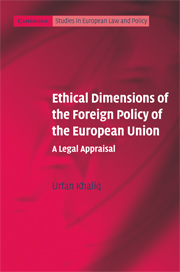Book contents
- Frontmatter
- Contents
- Series Editors' Preface
- Acknowledgements and Preface
- The Constitutional Treaty and the Reform Treaty: Table of Equivalences
- Table of Cases
- Table of Treaties
- List of Abbreviations
- 1 Introduction
- 2 Promoting Values in Foreign Relations: Policy and Legal Issues
- 3 Promoting Values and the International Relations of the Union and Community: Competence and Practice
- 4 Ethical Values and Foreign Policy in Practice: Responses to the Denial of Democracy in Myanmar, Nigeria and Pakistan
- 5 Ethical Values and Foreign Policy in Practice: the Role of the Union in the Middle East Peace Process and Relations with the Palestinian Authority and Israel
- 6 Ethical Values and Foreign Policy in Practice: Humanitarian Aid and the European Union
- 7 Conclusions
- Select Bibliography
- Index
3 - Promoting Values and the International Relations of the Union and Community: Competence and Practice
Published online by Cambridge University Press: 03 December 2009
- Frontmatter
- Contents
- Series Editors' Preface
- Acknowledgements and Preface
- The Constitutional Treaty and the Reform Treaty: Table of Equivalences
- Table of Cases
- Table of Treaties
- List of Abbreviations
- 1 Introduction
- 2 Promoting Values in Foreign Relations: Policy and Legal Issues
- 3 Promoting Values and the International Relations of the Union and Community: Competence and Practice
- 4 Ethical Values and Foreign Policy in Practice: Responses to the Denial of Democracy in Myanmar, Nigeria and Pakistan
- 5 Ethical Values and Foreign Policy in Practice: the Role of the Union in the Middle East Peace Process and Relations with the Palestinian Authority and Israel
- 6 Ethical Values and Foreign Policy in Practice: Humanitarian Aid and the European Union
- 7 Conclusions
- Select Bibliography
- Index
Summary
Introduction
This chapter aims to assess the competence of the European Community and European Union to promote human rights, democracy and other ethical values in third states. As systems based upon the conferral of powers, the Community and Union are only competent to act where powers have been transferred to them. The first part of the chapter examines the relationship between the Union and Community and the instruments through which they pursue their foreign policy objectives. The remainder of the chapter adopts a thematic approach to competence and examines how it has been used in practice. The discussion is focused on those aspects of practice which are most relevant to relations between the Union and developing states.
Relationship between the Union and Community and the Instruments Available for Implementing an Ethical Foreign Policy
Relationship between the Component Parts of the Union
Article 1 TEU states that the Union is founded on the European Communities. The Union is built upon the foundations laid by the Communities but it is not confined to them. Whether the structure of the Union is considered to be a Greek temple, a cathedral or a layered organisation, it is clear that, as it exists at the time of writing, there is a significant overlap between the objectives of the Communities in relation to third states and those of the Common Foreign and Security Policy (CFSP), which are defined in broader and less precise terms. In public international law, in such circumstances, the more specialised body should carry out its functions and not cede its powers to the more general institution of which it is a part.
- Type
- Chapter
- Information
- Ethical Dimensions of the Foreign Policy of the European UnionA Legal Appraisal, pp. 81 - 188Publisher: Cambridge University PressPrint publication year: 2008

